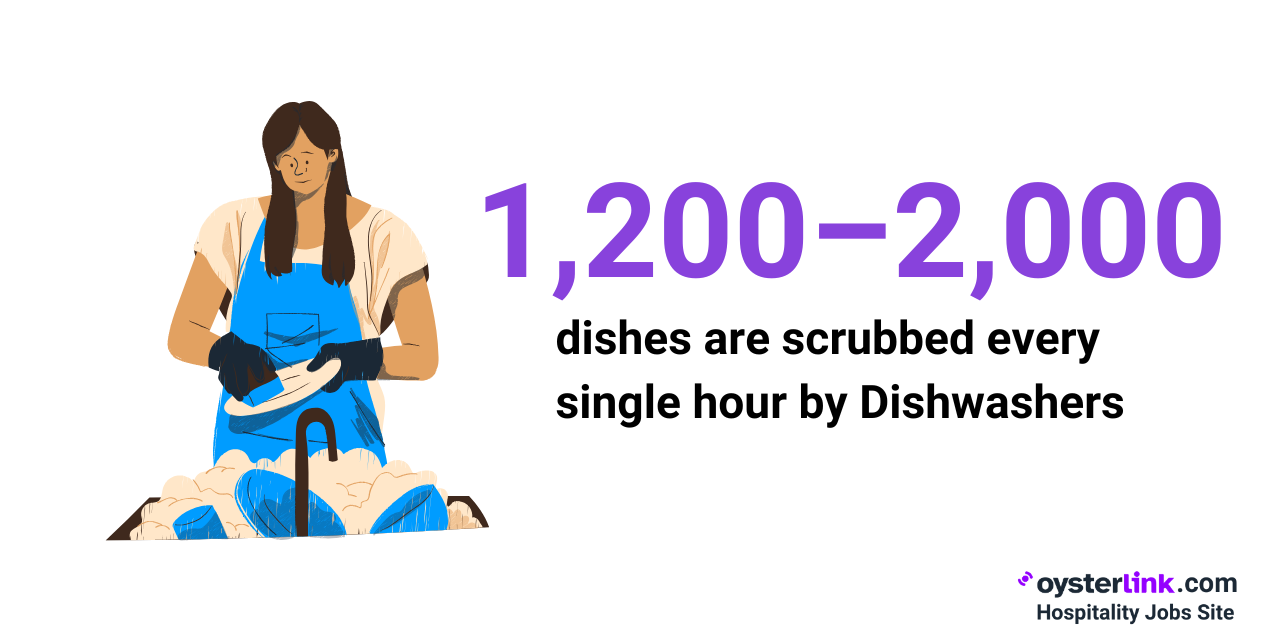Dishwasher Training: Key Takeaways
- Dishwashers clean up to 2,000 items per hour, keeping the kitchen running efficiently.
- Those with a high school diploma earn $893 more annually than Dishwashers without formal education.
- Top-paying roles in event services can reach $40,090 per year.
Dishwasher training is one of the most overlooked, yet most essential, part of running a smooth, safe, and efficient kitchen.
This article will show you how to build a strong training program that helps your team work smarter and stay longer.
Understanding the Dishwasher Role in Restaurant Dishwasher Training
The role of a Dishwasher extends far beyond simply cleaning dishes.
As a cornerstone of restaurant operations, this position directly impacts operational efficiency and customer satisfaction.
Source: The Bureau of Labor Statistics (BLS)
Impact on restaurant operations
Dishwashers are the backbone of any restaurant kitchen. They clean 1,200–2,000 dishes an hour, keeping the kitchenware ready and available so everything runs smoothly.
Without them, the kitchen stalls — delaying service and frustrating customers. Their work lets the team focus on delivering great service.

Key responsibilities overview
A Dishwasher's core duties encompass:
- Washing and sanitizing dishes, glassware, utensils and cookware
- Maintaining cleanliness of kitchen areas and storage spaces
- Supporting food prep activities when needed
This role requires attention to detail and strong time management skills to handle peak service periods effectively.
Food Safety Protocols in Dishwasher Training
The CDC estimates that 1 in 6 Americans fall ill from contaminated food, with foodborne illnesses claiming 3,000 lives annually.
This poses a significant challenge for the U.S. food industry, with an estimated cost of $15.6 billion annually.
That’s why Dishwashers are indispensable: they’re the first line of defense in preventing foodborne illnesses and protecting public health.
Cross-contamination prevention
Cross-contamination is a big no-no in any kitchen and preventing it starts with attention to detail.
Make sure your Dishwashers always store clean dishes at least six inches off the ground to keep dirt, debris, and moisture away.
Regularly check storage practices and remind your team of their importance — it’s these small habits that make a big difference.
Want to take cleanliness to the next level? Don’t miss our guide: How To Maintain Hygiene in the Hospitality Industry
Health department compliance
In the United States, restaurant health and safety regulations are primarily governed by state and local health departments.
These regulations are often based on the FDA's Food Code, which regulates specific practices to ensure food safety in restaurants.
Key areas to cover in your Dishwasher training program include things like food handling, employee hygiene and food allergen management.
Maximizing Efficiency in the Dish Pit with Dishwasher Efficiency Tips
Strategic organization of your dish pit area serves as the foundation for efficient kitchen operations.
A well-designed layout can reduce unnecessary movement and boost productivity throughout your shift.
High-volume service tips
During peak service hours, guiding your dishwashing team to adopt proven strategies can significantly boost efficiency:
- Pre-stack similar items to streamline washing.
- Use designated containers for silverware and small items.
- Maintain a steady rhythm by loading continuously while cycles run.
These techniques are vital in venues like event services, where Dishwashers earn the highest average salaries—up to $40,090/year.
The Value of Structured Restaurant Dishwasher Training
An employee undergoing Dishwasher training is just the beginning of their potential. The truth is, this role can open countless doors.
With your guidance, dedication and proper training, Dishwashers can build the foundation for a successful and rewarding career in hospitality.
Did you know? Dishwashers with a high school diploma earn $893 more per year on average than those without any formal education.
Career advancement opportunities
With the right guidance and support, team members can progress through roles such as:
- Dishwasher to Line Cook
- Line Cook to Sous Chef
- Sous Chef to Head Chef
- Kitchen Manager to Restaurant Manager
Willingness to go the extra mile set exceptional team members apart, showing the commitment and dependability essential in hospitality.
We spoke with Renee Petitjean, a Recruiting Manager at Marriott International, who’s reshaping how talent is chosen in hospitality.
We asked her, “What skills help employees stand out for promotions in hospitality?” Here’s what she told us:

Leadership skills development
45% of Dishwashers are over 40 years old, often valuing schedule stability, which makes investing in their long-term growth especially important.
Well-developed Dishwasher training systems provide the framework for them to understand their duties and responsibilities.
Empowering Your Dishwasher Team through Effective Dishwasher Training
Dishwashers are far more than support staff, they're the silent engine powering the kitchen.
When trained well, they not only ensure smooth service and food safety but also lay the groundwork for a thriving career in hospitality.
By investing in a structured training program, you’re not just filling a role, you’re shaping future Chefs, managers, and leaders.









Loading comments...